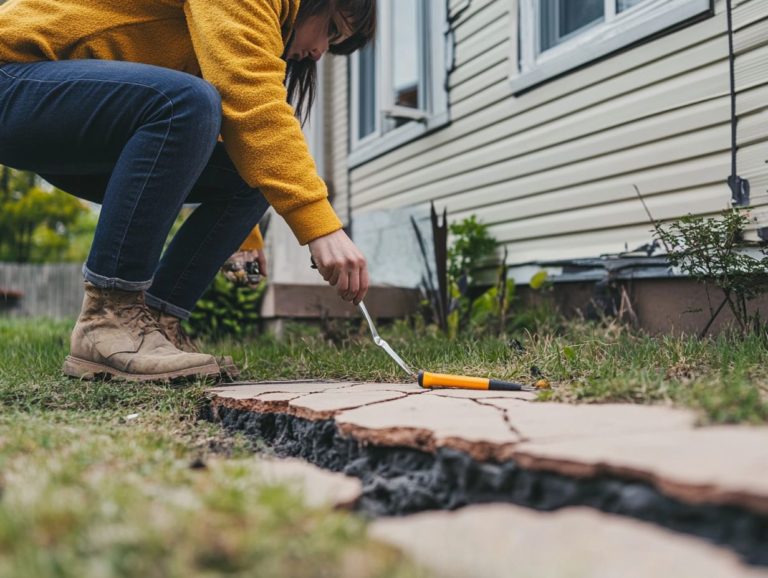5 Ways to Save for Your First Home
Saving for your first home may seem daunting, but it doesn t have to be a weight on your shoulders.
This article presents five practical strategies designed to guide you on your path to homeownership. You’ll discover the importance of establishing a realistic budget, cutting unnecessary expenses, exploring alternative housing options, and tapping into available government assistance.
You’ll also find answers to essential questions about down payments, mortgages, credit scores, and those sneaky hidden costs that can catch you off guard. Prepare to embark on your journey toward that dream home with confidence!
Contents
- Key Takeaways:
- 1. Set a Budget and Stick to It
- 2. Cut Back on Unnecessary Expenses
- 3. Increase Your Income
- 4. Consider Alternative Housing Options
- 5. Utilize Government Programs and Assistance
- How Much Money Do You Need to Save for a Down Payment?
- Frequently Asked Questions
- What are the top 5 ways to save for your first home?
- How can setting a budget help save for your first home?
- Why is saving for a down payment important?
- What are some ways to reduce expenses and save for a first home?
- How can increasing income help save for a first home?
- What first-time homebuyer programs are available to help save for a first home?
Key Takeaways:

Set a budget and stick to it. This ensures you re saving enough for your first home!
Cutting back on unnecessary expenses can help you save more money for your down payment.
Increasing your income through side hustles or asking for a raise can accelerate your savings for your dream home.
1. Set a Budget and Stick to It
Creating a realistic budget is crucial for first-time homebuyers. It helps you understand your finances and keep track of your monthly goals.
A well-structured budget considers various expenses think mortgage payments, closing costs, and everyday living expenses. This helps you make informed choices and avoid costly financial missteps.
To craft a comprehensive housing budget, incorporate all potential costs, including:
- Private mortgage insurance (PMI), which protects the lender if you default on your loan.
- Property taxes, which are fees paid to local governments based on your home’s value.
- Homeowners insurance, covering potential damages to your property.
It s crucial to itemize these expenses and regularly monitor your monthly spending. This way, you can pinpoint areas where you can cut back. Utilizing budgeting tools and apps can streamline this process, making it easier and more efficient.
Consulting a financial advisor can provide valuable insights into optimizing your cash flow and uncovering hidden savings opportunities. This keeps your homeownership experience enjoyable rather than overwhelming.
By paying close attention to budgeting details, you ll be setting the stage for a stable financial life long after the purchase is made.
2. Cut Back on Unnecessary Expenses
Trimming unnecessary expenses can significantly boost your savings. This paves the way for a more favorable financial landscape for future investments, like a down payment on a house.
Examine your daily habits, such as how often you dine out or the number of subscription services you hold many of which likely gather dust.
These adjustments, while they may seem minor, can lead to substantial savings over time.
For example, choosing home-cooked meals over regular restaurant outings not only saves you money but also fosters a healthier lifestyle. Likewise, reassessing your subscription services to eliminate the redundant can free up funds for pursuits that truly matter to you.
By making these straightforward lifestyle changes, you can experience a noticeable improvement in your cash flow. This helps you steadily progress toward your long-term financial goals.
3. Increase Your Income
Increasing your income through various avenues, such as a side hustle, can significantly accelerate your savings for a down payment. This ultimately makes homeownership a reality much sooner than you might expect.
Explore options like freelance work, part-time jobs, or even investing in stocks and mutual funds. These can cultivate additional revenue streams that enhance your financial flexibility.
This supplemental income boosts your cash flow and allows you to build a safety net through increased savings. Having multiple income sources serves as a cushion against unexpected expenses, contributing to a more resilient financial strategy.
Just imagine how swiftly your savings could multiply when supported by consistent freelance gigs or savvy investment decisions, bringing your dream of homeownership tantalizingly close!
4. Consider Alternative Housing Options

As a first-time buyer, exploring alternative housing options can unlock new pathways to homeownership, especially in a real estate market where home prices can be as unpredictable as the weather.
Consider options like condos, townhouses, or even fixer-uppers; they often serve as more budget-friendly entry points. These alternatives not only lower your initial investment but also provide the opportunity to build equity over time.
As the value of these properties appreciates, your financial stake in your home grows, too. There are numerous financial assistance programs available, offering grants or low-interest loans aimed at helping first-time buyers like you navigate the journey to ownership.
Let s unlock the dream of homeownership together! This makes the dream of having your own home more attainable than ever.
5. Utilize Government Programs and Assistance
Government programs and assistance can significantly ease the financial strain on first-time buyers like you. They offer options such as FHA loans, VA loans, and USDA loans that make homeownership more achievable, even in the face of rising housing costs.
These programs come with tailored eligibility requirements designed for various demographics, including veterans, rural residents, and individuals with low to moderate incomes. By leveraging these options, you can substantially lower your closing costs and down payment, sometimes needing as little as 3.5% down for FHA loans or even zero down for VA loans.
Understanding more ways to save can enhance your affordability. This knowledge gives you the power to navigate the intricate real estate landscape with greater ease and financial confidence.
How Much Money Do You Need to Save for a Down Payment?
Determining how much money you need to save for a down payment is a pivotal step in your financial planning as a home buyer. This amount can fluctuate significantly depending on the purchase price of the home and the type of mortgage you opt for, not to mention the associated closing costs.
For instance, if you re considering a conventional loan, you might need to put down at least 20% to steer clear of private mortgage insurance (PMI). On the other hand, FHA loans can be much more forgiving, allowing you to secure your dream home with as little as 3.5% down.
Grasping these varying requirements is essential. A mortgage calculator can help you understand your monthly payments, making budgeting easier!
Crafting a robust savings plan is key. Consider setting specific goals, like reserving a certain amount each month, to expedite your down payment journey.
You might also explore options such as high-yield savings accounts or investment tools to boost your savings, ultimately paving the way for a more rewarding home-buying experience.
What Are the Different Types of Mortgages Available?
Understanding the various types of mortgages available is crucial for you as a potential homebuyer. Each option be it FHA loans, VA loans, or USDA loans comes with unique benefits and requirements tailored to different financial situations.
FHA loans are often a go-to choice for first-time buyers, allowing for lower down payments and accommodating those with lower credit scores. This makes the dream of homeownership more accessible than ever.
If you re a veteran or active-duty military personnel, VA loans offer significant advantages, such as zero down payment options and no private mortgage insurance requirements, greatly enhancing affordability.
For those considering rural properties, USDA loans present an excellent opportunity. They require minimal down payments and are specifically designed for low- to moderate-income families.
It’s important for you to be aware of PMI implications, as this can increase your monthly costs if your down payment is less than 20%. Consulting a financial advisor is highly recommended; they can provide personalized advice tailored to your unique circumstances and aspirations, ensuring you make informed decisions.
With the right knowledge and tools, your dream home is closer than you think!
How Can You Improve Your Credit Score to Qualify for a Mortgage?

Improving your credit score is essential for qualifying for a mortgage. Lenders view this metric as critical in assessing your financial reliability and ability to manage debt effectively.
Taking practical steps, such as paying down existing debt and ensuring timely bill payments, can significantly enhance your credit profile.
Regularly monitoring your credit reports allows you to identify discrepancies and pinpoint areas that need improvement.
Establishing sound financial habits, like creating a budget and sticking to it, is vital for maintaining a positive credit history.
If you’re uncertain about where to begin, seeking advice from a financial advisor can offer tailored strategies and insights. This can pave the way for a more promising financial future.
What Are the Hidden Costs of Buying a Home?
When you re in the market for a home, be mindful of the hidden costs that can impact your financial planning. These include closing costs, private mortgage insurance (PMI), and ongoing maintenance expenses that contribute to the total cost of ownership.
In addition to these expenses, you may encounter inspection fees that help uncover potential issues before they become costly repairs. Don’t forget about property taxes, which can fluctuate and catch you by surprise.
These costs affect your immediate budget and can impede the overall equity you build over time, especially if unexpected repairs arise shortly after you move in. Therefore, it s crucial for anyone stepping into homeownership to factor in these variables.
By doing this, you can ensure your financial situation remains stable and that you re fully prepared for the realities of owning a property.
How Can You Negotiate a Lower Price for a Home?
Negotiating a lower price for a home is an essential skill for you as a homebuyer. It can lead to substantial savings that enhance your budget and lessen your overall expenses during the home-buying journey.
By approaching negotiations with a well-researched strategy, you can navigate the complexities of the real estate market with confidence. Understanding current market trends and the seller’s motivations gives you the power to make informed and reasonable offers.
Engaging a knowledgeable real estate agent or financial advisor can significantly enhance your negotiating position. These professionals excel at identifying savings opportunities and can provide valuable insights to help you articulate your case effectively.
Ultimately, combining these strategies sets you up for successful negotiations and ensures a rewarding home purchase experience.
What Are the Common Mistakes to Avoid When Saving for a Home?
When saving for a home, you might fall into common traps that can derail your financial planning and savings strategies. This can hinder your journey to homeownership.
One major pitfall is underestimating the total costs involved in purchasing a home, which often extend well beyond the down payment. Don’t let surprises derail your plans! Factor in ongoing costs like property taxes, maintenance, and insurance.
Overlooking potential emergencies can leave you unprepared for financial shocks that could jeopardize your savings goals. Regularly reviewing and adjusting your budget is key to navigating these challenges effectively.
By adopting best practices, such as setting a realistic savings timeline and building a contingency fund, you can pave a robust path toward achieving your dream of homeownership.
Frequently Asked Questions

What are the top 5 ways to save for your first home?
The top 5 ways to save for your first home include setting a budget, saving for a down payment, reducing your expenses, increasing your income, and utilizing budgeting strategies for your first home.
How can setting a budget help save for your first home?
Setting a budget helps you track your expenses and identify areas where you can cut back and save money for your first home. It also aids in planning and prioritizing your spending.
Why is saving for a down payment important?
Saving for a down payment lowers your monthly mortgage payments. It also reduces the total interest you pay over the life of your loan.
A larger down payment makes you a more appealing borrower to lenders.
What are some ways to reduce expenses and save for a first home?
You can cut back on unnecessary purchases. Negotiating bills and finding savings on groceries and transportation can also help.
How can increasing income help save for a first home?
Boosting your income through a side hustle or asking for a raise can help you save more. This extra money contributes to your down payment or other homeownership expenses.
What first-time homebuyer programs are available to help save for a first home?
Many first-time homebuyer programs offer down payment assistance and grants. These programs differ by state, so research is key to see if you qualify.






